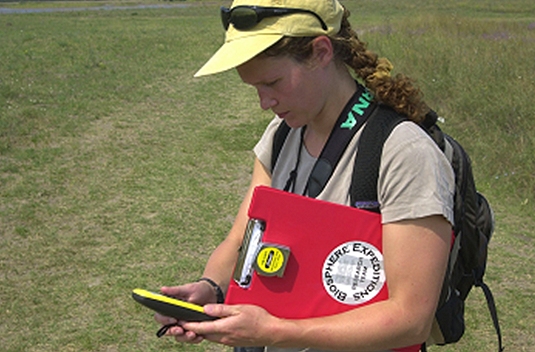VOLUNTEER IMPACT - A QUESTION OF CULTURE
by Kathy Wilden, Director
The value of volunteers in scientific data collection has recently been ‘proven’ again. This comes as no surprise, but it still seems that there are some scientists out there who doubt the value of the data collected. Since the early 80s many scientists have shown their faith in this process and many respected scientific papers have been produced based on the work of volunteers.

Which way was north? The author grappling with a GPS. ![]()
The recent work to show the value of volunteers was in a study published by J. Foster-Smith and S.M. Evans in 2003. Their work was based on work with volunteers on a project on the Isle of Cumbrae in Scotland. Given the fact that there is almost certainly neither the manpower, nor the financial resources to meet the demands that are being placed upon science, then the importance of papers like this in convincing the unbelievers of the benefits of volunteer participation cannot be overstated. However, I think the more interesting findings are hidden beneath this headline conclusion. The other deductions in the report have some useful pointers for both Biosphere Expeditions as an organisation and for the team members who come on expedition with us.
The volunteers that were studied did make some mistakes in their work, but these were similar errors to those that were also made by experienced scientists. The report suggests that there were three reasons for the volunteer mistakes: 1) lack of experience; 2) inadequate guidelines; and 3) insufficient training. On the first point there is little that we can do. It is clear that in some areas lack of specific experience might be a drawback but I don’t think this applies strongly to our expeditions, as we only work on scientific studies that can be carried out by laypeople and they are designed for people with no experience. We will continue to work on the design of the science to ensure that this continues to work for us. But also, I have seen so many instances where team members’ different experiences have benefited a project that I think the pluses of alternative backgrounds outweigh any potential drawbacks. People bring professional skills such as IT and teaching, as well as their softer skills such as their ability to empathise with others and their, often boundless, enthusiasm – these things cannot be taught and bring so much to an expedition.
I believe that the other two points give us the key lessons from this report. You can have as much enthusiasm and experience as you like, but unless you are told what to do and how to do it, there is no chance that you will produce good information for anything, let alone data that will be good enough to support a scientific publication. Ensuring that people are well briefed and that all aspects of the training are thought out is crucial and something that we continually strive to improve. But the other side to this issue is much more complicated and involves creating a culture on expedition. We need to be particularly careful of how people (and I mean all the people involved in the expedition, from the team members, to the cooks, to the expedition leaders) are properly involved once they are out in the field. People need to feel that they are part of a team, that their views are important, that they have a crucial part to play and most importantly of all, that any question is a good question. If we can have a culture on all our expeditions where people feel that they can ask anything (and give any view) and that they will be listened to and that their contribution will be valued, then I think that people will feel completely involved. They can be sure that they know everything that they need to know in order to be able to contribute effectively to the scientific work of the team. And that, after all, is what it is all about.
So if you are into making resolutions, and you feel that there is space for you to squeeze another one in, please have a thought for how you can personally help to inspire and involve the people involved in our expeditions. You may be able to help by simply being a positive person when you are on expedition, or when you talk about the way that people can go on such expeditions. You may be able to help by asking lots of questions when you are ‘out there’ so that others feel encouraged, or you may be one of the people who are giving the answers, in which case remember to be kind and patient (even though it may be the seventh time that you’ve answered the same question that week). If we all do our bit to create a supportive and enquiring culture, then I’m sure that everyone will go out into the field with a better understanding and feel for what they are doing. This will mean a better informed group of team members and will help to minimise the little mistakes that would otherwise be made. The volunteers studied by Foster-Smith and Evans only made the mistakes that scientists also made. With the right support this means that volunteers could become even better at this work than the ‘professionals’. Something to think about. And certainly something to work towards for better results!
Also read - Can laypeople really be of help to serious research & conservation projects?
